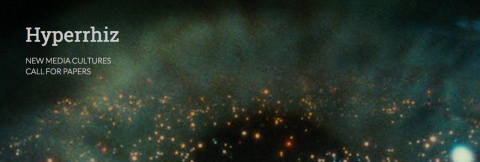Hyperrhiz, the peer-reviewed online journal specializing in new media criticism and net art, invites proposals for its special issue!
How global is electronic literature (e-lit)? Without a doubt, e-lit is exciting and takes literature into the future; but is it diverse and multicultural? At first glance, e-lit is markedly un-global and lacks diversity. Existing discussions and definitions of electronic literature propose formal principles, perhaps with reference to communities, histories, or practices of production. An extensive critical practice and history is codified around the hypertext e-lit that emerged in the USA in the 1980's, and by subsequent refinements and extensions of this paradigm. In all this, there is little evidence of a concern for geography, nationality, and politics. These problematics are not simply secondary in discussions of e-lit–they are silent and invisible. Indeed: arguably e-lit is constituted only through the exclusion of concerns with globalization and transnationality. In this sense, electronic literature is an extension of the imperial archipelago of European literature and its New World expansions and experimentations. As a result, this special issue asks: what would global electronic literatures look like?
Of course, this is a first glance and no doubt the situation is more complex. Certainly e-lit is being produced, discussed, read, and archived far beyond the USA and Europe. Anyone with some knowledge of the field will offer examples to support this broader view. Thriving communities and diverse practices are at work in Africa, the Middle East, South America, and Asia. Is this a surprise? Perhaps it is, since the canonized works of e-lit are not at all from these regions and linguistic/cultural communities. Such evidence for a global e-lit heightens the question: why is e-lit not approached in this manner? Why are nationality, geography, and politics not in the foreground? The realities of global e-lit outpace and leave behind critical practice and formal discourses.
This special issue of Hyperrhiz moves in several directions to globalize e-lit. First, it interrogates the existing histories and theories of e-lit to diagnose an excluded global unconscious. Second, it offers new works and approaches from a wider geographical scope than currently offered by e-lit. This issue both upsets existing views of e-lit to show their parochial and regional assumptions, and celebrates the realities of e-lit as a global phenomena. In the process, e-lit is re-placed in an unmapped field of multiple linguistic/literary cultures and media environments. The hope is to arrive at an expansive, inclusive, and truly global field.
The editors invite essays that critically engage with the e-lit field, as well as contributions that introduce new regional and national approaches. A selected number of artistic works will also be selected to accompany the issue. Deadlines are as follows.
December 7, 2015. Proposals of no more than 500 words accompanied by biography of no more than 100 words to sbaldwin66@gmail.com.
January 25, 2016. Response to all proposals from the editors. Accepted proposals will be provided complete formatting guidelines.
April 25, 2016. Full essays, based on accepted proposals, of no more than 6000 words.
Fall 2016. Publication of the special issue.

